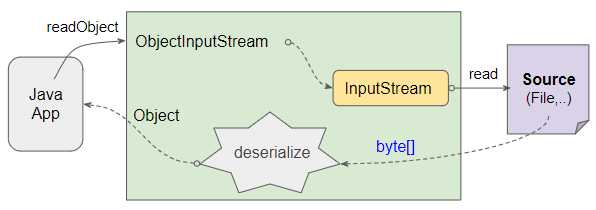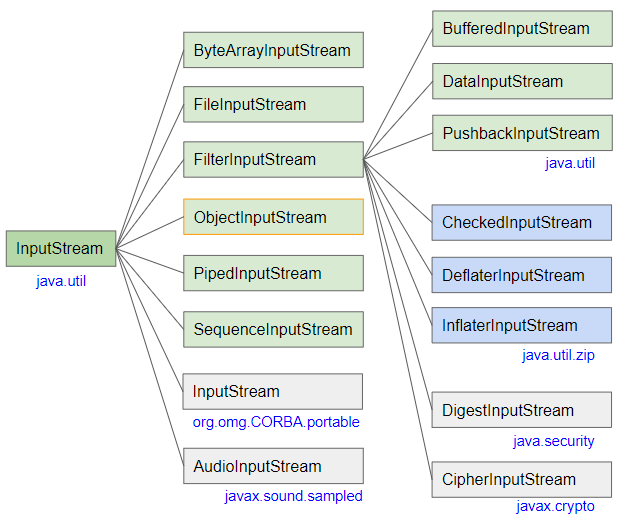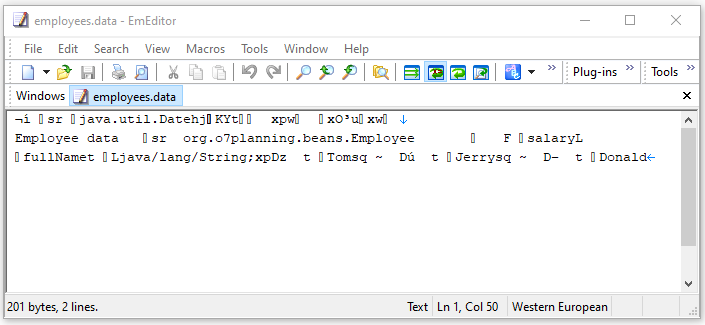Java ObjectInputStream Tutorial with Examples
1. ObjectInputStream
ObjectInputStream is a subclass of InputStream class, which manages an InputStream object and provides methods to read primitive data or object from the InputStream that it manages.

public class ObjectInputStream
extends InputStream implements ObjectInput, ObjectStreamConstantsObjectInputStream is used to read the data sources written by ObjectOutputStream.

- InputStream
- FileInputStream
- ByteArrayInputStream
- PushbackInputStream
- PipedInputStream
- SequenceInputStream
- BufferedInputStream
- DataInputStream
- FilterInputStream
- AudioInputStream
- InflaterInputStream
- DigestInputStream
- DeflaterInputStream
- CipherInputStream
- CheckedInputStream
ObjectInputStream methods
public boolean readBoolean() throws IOException
public byte readByte() throws IOException
public int readUnsignedByte() throws IOException
public char readChar() throws IOException
public short readShort() throws IOException
public int readUnsignedShort() throws IOException
public int readInt() throws IOException
public long readLong() throws IOException
public float readFloat() throws IOException
public double readDouble() throws IOException
public void readFully(byte[] buf) throws IOException
public void readFully(byte[] buf, int off, int len) throws IOException
public int skipBytes(int len) throws IOException
public String readUTF() throws IOException
public final ObjectInputFilter getObjectInputFilter()
public final void setObjectInputFilter(ObjectInputFilter filter)
public final Object readObject() throws IOException, ClassNotFoundException
public Object readUnshared() throws IOException, ClassNotFoundException
public void defaultReadObject() throws IOException, ClassNotFoundException
public ObjectInputStream.GetField readFields() throws IOException, ClassNotFoundException
public void registerValidation(ObjectInputValidation obj, int prio) throws NotActiveException, InvalidObjectException
protected Class<?> resolveClass(ObjectStreamClass desc) throws IOException, ClassNotFoundException
protected Object readObjectOverride() throws IOException, ClassNotFoundException
protected Class<?> resolveProxyClass(String[] interfaces) throws IOException, ClassNotFoundException
protected Object resolveObject(Object obj) throws IOException
protected boolean enableResolveObject(boolean enable) throws SecurityException
protected void readStreamHeader() throws IOException, StreamCorruptedException
protected ObjectStreamClass readClassDescriptor() throws IOException, ClassNotFoundException
String readTypeString() throws IOException
// Methods inherited from InputStream:
public int read() throws IOException
public int read(byte[] buf, int off, int len) throws IOException
public int available() throws IOException
public void close() throws IOExceptionObjectInputStream constructors
public ObjectInputStream(InputStream in)2. Example 1
In this example we will write Employee objects to a file, then use ObjectInputStream to read the file.
Employee class needs to implement Serializable interface, which is necessary so that it can be written to an ObjectOutputStream.
Employee.java
package org.o7planning.beans;
import java.io.Serializable;
public class Employee implements Serializable {
private static final long serialVersionUID = 1L;
private String fullName;
private float salary;
public Employee(String fullName, float salary) {
this.fullName = fullName;
this.salary = salary;
}
public String getFullName() {
return fullName;
}
public void setFullName(String firstName) {
this.fullName = firstName;
}
public float getSalary() {
return salary;
}
public void setSalary(float lastName) {
this.salary = lastName;
}
}Next, use ObjectOutputStream to write Employee objects to the file.
WriteEmployeeDataEx.java
package org.o7planning.objectinputstream.ex;
import java.io.File;
import java.io.FileOutputStream;
import java.io.IOException;
import java.io.ObjectOutputStream;
import java.io.OutputStream;
import java.util.Date;
import org.o7planning.beans.Employee;
public class WriteEmployeeDataEx {
// Windows: C:/Data/test/employees.data
private static String file_path = "/Volumes/Data/test/employees.data";
public static void main(String[] args) throws IOException {
File outFile = new File(file_path);
outFile.getParentFile().mkdirs();
Employee e1 = new Employee("Tom", 1000f);
Employee e2 = new Employee("Jerry", 2000f);
Employee e3 = new Employee("Donald", 1200f);
Employee[] employees = new Employee[] { e1, e2, e3 };
OutputStream os = new FileOutputStream(outFile);
ObjectOutputStream oos = new ObjectOutputStream(os);
System.out.println("Writing file: " + outFile.getAbsolutePath());
oos.writeObject(new Date());
oos.writeUTF("Employee data"); // Some informations.
oos.writeInt(employees.length); // Number of Employees
for (Employee e : employees) {
oos.writeObject(e);
}
oos.close();
System.out.println("Finished!");
}
}After running WriteEmployeeDataEx class, we get a file with confusing content

Finally, use ObjectInputStream to read the file just written in the previous step.
ReadEmployeeDataEx.java
package org.o7planning.objectinputstream.ex;
import java.io.File;
import java.io.FileInputStream;
import java.io.IOException;
import java.io.InputStream;
import java.io.ObjectInputStream;
import java.util.Date;
import org.o7planning.beans.Employee;
public class ReadEmployeeDataEx {
// Windows: C:/Data/test/employees.data
private static String file_path = "/Volumes/Data/test/employees.data";
public static void main(String[] args) throws IOException, ClassNotFoundException {
File inFile = new File(file_path);
InputStream is = new FileInputStream(inFile);
ObjectInputStream ois = new ObjectInputStream(is);
System.out.println("Reading file: " + inFile.getAbsolutePath());
System.out.println();
Date date = (Date) ois.readObject();
String info = ois.readUTF();
System.out.println(date);
System.out.println(info);
System.out.println();
int employeeCount = ois.readInt();
for(int i=0; i< employeeCount; i++) {
Employee e = (Employee) ois.readObject();
System.out.println("Employee Name: " + e.getFullName() +" / Salary: " + e.getSalary());
}
ois.close();
}
}Output:
Reading file: /Volumes/Data/test/employees.data
Sat Mar 20 18:54:24 KGT 2021
Employee data
Employee Name: Tom / Salary: 1000.0
Employee Name: Jerry / Salary: 2000.0
Employee Name: Donald / Salary: 1200.03. readFields()
Suppose you use ObjectInputStream to read a GameSetting object from a file. At the same time, while reading GameSetting object, you want to modify values of some of its fields.
GameSetting.java
package org.o7planning.beans;
import java.io.IOException;
import java.io.ObjectInputStream;
public class GameSetting implements java.io.Serializable {
private static final long serialVersionUID = 1L;
private int sound;
private int bightness;
private String difficultyLevel;
private String userNote;
public GameSetting(int sound, int bightness, String difficultyLevel, String userNote) {
this.sound = sound;
this.bightness = bightness;
this.difficultyLevel = difficultyLevel;
this.userNote = userNote;
}
public int getSound() {
return sound;
}
public int getBightness() {
return bightness;
}
public String getDifficultyLevel() {
return difficultyLevel;
}
public String getUserNote() {
return userNote;
}
// Do not change name and parameter of this method.
private void readObject(ObjectInputStream in) throws IOException, ClassNotFoundException {
ObjectInputStream.GetField fields = in.readFields();
this.sound = fields.get("sound", 50);
this.bightness = fields.get("bightness", 50);
// Edit fields
this.difficultyLevel = (String) fields.get("difficultyLevel", "Easy"); // Default
if (this.difficultyLevel == null) {
this.difficultyLevel = "Easy";
}
this.userNote = (String) fields.get("userNote", "Have fun!"); // Default
if (this.userNote == null) {
this.userNote = "Have fun!";
}
}
}ObjectInputStream_readFields.java
package org.o7planning.objectinputstream.ex;
import java.io.File;
import java.io.FileInputStream;
import java.io.FileOutputStream;
import java.io.IOException;
import java.io.InputStream;
import java.io.ObjectInputStream;
import java.io.ObjectOutputStream;
import java.io.OutputStream;
import java.util.Date;
import org.o7planning.beans.GameSetting;
public class ObjectInputStream_readFields {
// Windows: C:/Data/test/game_setting.data
private static String file_path = "/Volumes/Data/test/game_setting.data";
public static void main(String[] args) throws IOException, ClassNotFoundException {
GameSetting setting = new GameSetting(10, 80, null, null);
writeGameSetting(setting);
readGameSetting();
}
private static void writeGameSetting(GameSetting setting) throws IOException {
File file = new File(file_path);
file.getParentFile().mkdirs();
OutputStream os = new FileOutputStream(file);
ObjectOutputStream oos = new ObjectOutputStream(os);
// Write a String
oos.writeUTF("Game Settings, Save at " + new Date());
// Write Object
oos.writeObject(setting);
oos.close();
}
private static void readGameSetting() throws IOException, ClassNotFoundException {
File file = new File(file_path);
file.getParentFile().mkdirs();
InputStream is = new FileInputStream(file);
ObjectInputStream ois = new ObjectInputStream(is);
// Read a String
String info = ois.readUTF();
// Read fields
GameSetting setting = (GameSetting) ois.readObject();
System.out.println("sound: " + setting.getSound());
System.out.println("bightness: " + setting.getBightness());
System.out.println("difficultyLevel: " + setting.getDifficultyLevel());
System.out.println("userNote: " + setting.getUserNote()); // null.
ois.close();
}
}Output:
sound: 10
bightness: 80
difficultyLevel: Easy
userNote: Have fun!4. readUnshared()
ObjectInputStream.readUnshared() method is used to read an object written by ObjectOutputStream.writeUnshared(Object) method.
ObjectInputStream_readUnshared.java
package org.o7planning.objectinputstream.ex;
import java.io.File;
import java.io.FileInputStream;
import java.io.FileOutputStream;
import java.io.IOException;
import java.io.InputStream;
import java.io.ObjectInputStream;
import java.io.ObjectOutputStream;
import java.io.OutputStream;
import java.util.ArrayList;
public class ObjectInputStream_readUnshared {
// Windows: C:/Data/test/test1.data
private static String file_path = "/Volumes/Data/test/test.data";
public static void main(String[] args) throws IOException, ClassNotFoundException {
writeUnsharedTest();
readUnsharedTest();
}
private static void writeUnsharedTest() throws IOException {
File file = new File(file_path);
file.getParentFile().mkdirs();
ArrayList<String> list = new ArrayList<String>();
list.add("One");
list.add("Two");
OutputStream os = new FileOutputStream(file);
ObjectOutputStream oos = new ObjectOutputStream(os);
oos.writeUnshared(list); // Write the first time
oos.writeUnshared(list); // Write the second time
oos.close();
}
@SuppressWarnings({ "unchecked" })
private static void readUnsharedTest() throws IOException, ClassNotFoundException {
File file = new File(file_path);
ArrayList<String> list = new ArrayList<String>();
list.add("One");
list.add("Two");
InputStream is = new FileInputStream(file);
ObjectInputStream ois = new ObjectInputStream(is);
ArrayList<String> list1 = (ArrayList<String>) ois.readUnshared();
ArrayList<String> list2 = (ArrayList<String>) ois.readUnshared();
System.out.println("list1 == list2? " + (list1 == list2));
ois.close();
}
}Output:
list1 == list2? falseSee an explanation of ObjectOutputStream.writeUnshared(Object) method:
Java IO Tutorials
- Java CharArrayWriter Tutorial with Examples
- Java FilterReader Tutorial with Examples
- Java FilterWriter Tutorial with Examples
- Java PrintStream Tutorial with Examples
- Java BufferedReader Tutorial with Examples
- Java BufferedWriter Tutorial with Examples
- Java StringReader Tutorial with Examples
- Java StringWriter Tutorial with Examples
- Java PipedReader Tutorial with Examples
- Java LineNumberReader Tutorial with Examples
- Java PrintWriter Tutorial with Examples
- Java IO Binary Streams Tutorial with Examples
- Java IO Character Streams Tutorial with Examples
- Java BufferedOutputStream Tutorial with Examples
- Java ByteArrayOutputStream Tutorial with Examples
- Java DataOutputStream Tutorial with Examples
- Java PipedInputStream Tutorial with Examples
- Java OutputStream Tutorial with Examples
- Java ObjectOutputStream Tutorial with Examples
- Java PushbackInputStream Tutorial with Examples
- Java SequenceInputStream Tutorial with Examples
- Java BufferedInputStream Tutorial with Examples
- Java Reader Tutorial with Examples
- Java Writer Tutorial with Examples
- Java FileReader Tutorial with Examples
- Java FileWriter Tutorial with Examples
- Java CharArrayReader Tutorial with Examples
- Java ByteArrayInputStream Tutorial with Examples
- Java DataInputStream Tutorial with Examples
- Java ObjectInputStream Tutorial with Examples
- Java InputStreamReader Tutorial with Examples
- Java OutputStreamWriter Tutorial with Examples
- Java InputStream Tutorial with Examples
- Java FileInputStream Tutorial with Examples
Show More